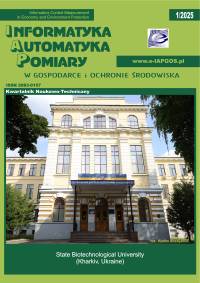PRZEGLĄD OSIĄGNIĘĆ PRACOWNIKÓW POLITECHNIKI LUBELSKIEJ W DZIEDZINIE WYKORZYSTANIA ZBIORÓW ROZMYTYCH
Maciej Celiński
m.celinski@pollub.plLublin University of Technology, Faculty of Mathematics and Technical Computer Science (Polska)
https://orcid.org/0000-0001-8412-207X
Adam Kiersztyn
Lublin University of Technology, Faculty of Mathematics and Technical Computer Science (Polska)
https://orcid.org/0000-0001-5222-8101
Abstrakt
W niniejszym artykule przedstawiamy przegląd badań nad zastosowaniami teorii zbiorów rozmytych prowadzonych przez naukowców z Politechniki Lubelskiej. Skupiamy się na analizie trendów badawczych i praktycznych zastosowaniach zbiorów rozmytych w analizie szeregów czasowych oraz imputacji brakujących danych. Zbiory rozmyte stanowią kluczową metodologię do rozwiązywania problemów związanych z niepewnością i nieprecyzyjnością danych. Omawiamy różne techniki w dziedzinie zbiorów rozmytych, w tym klasyfikację rozmytą, wykrywanie wartości odstających oraz imputację brakujących danych, podkreślając ich znaczenie w różnych dziedzinach nauki i życia społecznego. Przedstawione wyniki wskazują na potencjał innowacyjnych badań i dalszego rozwoju w tej dziedzinie. Społeczność akademicka Politechniki Lubelskiej odgrywa istotną rolę w promowaniu i rozwijaniu teorii zbiorów rozmytych, co jest kluczowe dla przyszłych badań naukowych i technologicznych.
Słowa kluczowe:
zbiory rozmyte, metody rozmyte, wykrywanie wartości odstających, klasyfikacja rozmyta, uzupełnianie brakujących danychBibliografia
Badurowicz M., Montusiewicz J., Karczmarek P.: Detection of Road Artefacts Using Fuzzy Adaptive Thresholding. IEEE International Conference on Fuzzy Systems, 2020 [https://doi.org/10.1109/FUZZ48607.2020.9177822].
DOI: https://doi.org/10.1109/FUZZ48607.2020.9177822
Google Scholar
Badurowicz M., Karczmarek P., Montusiewicz J.: Fuzzy Extensions of Isolation Forests for Road Anomaly Detection. IEEE International Conference on Fuzzy Systems, 2021 [https://doi.org/10.1109/FUZZ45933.2021.9494469].
DOI: https://doi.org/10.1109/FUZZ45933.2021.9494469
Google Scholar
Bojanowska A. B., Kulisz M.: Using Fuzzy Logic to Make Decisions Based on the Data From Customer Relationship Management Systems. Advances in Science and Technology Research Journal 17(5), 2023 [https://doi.org/10.12913/22998624/172374].
DOI: https://doi.org/10.12913/22998624/172374
Google Scholar
Czerwinski D. et al.: An Application of Fuzzy C-Means, Fuzzy Cognitive Maps, and Fuzzy Rules to Forecasting First Arrival Date of Avian Spring Migrants. IEEE International Conference on Fuzzy Systems, 2020 [https://doi.org/10.1109/FUZZ48607.2020.9177763].
DOI: https://doi.org/10.1109/FUZZ48607.2020.9177763
Google Scholar
Czerwinski D. et al.: Influence of the Fuzzy Robust Gamma Rank Correlation, Fuzzy C-Means, and Fuzzy Cognitive Maps to Predict the Z Generation's Acceptance Attitudes Towards Internet Health Information. IEEE International Conference on Fuzzy Systems, 2021 [https://doi.org/10.1109/FUZZ45933.2021.9494596].
DOI: https://doi.org/10.1109/FUZZ45933.2021.9494596
Google Scholar
Dolecki M. et al.: On the Understanding of Anomalies in the Oculography Data and Their Classification with an Application of Fuzzy Aggregators. IEEE International Conference on Fuzzy Systems, 2022 [https://doi.org/10.1109/FUZZ-IEEE55066.2022.9882877].
DOI: https://doi.org/10.1109/FUZZ-IEEE55066.2022.9882877
Google Scholar
Gola A., Kłosowski G.: Development of computer-controlled material handling model by means of fuzzy logic and genetic algorithms. Neurocomputing 338, 2019 [https://doi.org/10.1016/j.neucom.2018.05.125].
DOI: https://doi.org/10.1016/j.neucom.2018.05.125
Google Scholar
Jasiulewicz-Kaczmarek M., Żywica P., Gola A.: Fuzzy set theory driven maintenance sustainability performance assessment model: a multiple criteria approach. Journal of Intelligent Manufacturing 32(5), 2021 [https://doi.org/10.1007/s10845-020-01734-3].
DOI: https://doi.org/10.1007/s10845-020-01734-3
Google Scholar
Karczmarek P. et al.: K-Medoids Clustering and Fuzzy Sets for Isolation Forest. IEEE International Conference on Fuzzy Systems, 2021 [https://doi.org/10.1109/FUZZ45933.2021.9494460].
DOI: https://doi.org/10.1109/FUZZ45933.2021.9494460
Google Scholar
Karczmarek P. et al.: Fuzzy C-Means-based Isolation Forest. Applied Soft Computing 106, 2021 [https://doi.org/10.1016/j.asoc.2021.107354].
DOI: https://doi.org/10.1016/j.asoc.2021.107354
Google Scholar
Kiersztyn A. et al.: Detection and Classification of Anomalies in Large Datasets on the Basis of Information Granules, in IEEE Transactions on Fuzzy Systems 30(8), 2022, 2850–2860 [https://doi.org/10.1109/TFUZZ.2021.3076265].
DOI: https://doi.org/10.1109/TFUZZ.2021.3076265
Google Scholar
Kiersztyn A. et al.: Analysis of the Homozygosity of Microsatellite Markers by Using Fuzzy Sets. IEEE International Conference on Fuzzy Systems, 2022 [https://doi.org/10.1109/FUZZ-IEEE55066.2022.9882630].
DOI: https://doi.org/10.1109/FUZZ-IEEE55066.2022.9882630
Google Scholar
Kiersztyn A., Kiersztyn K.: Fuzzy Modification of Analytic Hierarchy Process Using GUI Tools. IEEE International Conference on Fuzzy Systems, 2022 [https://doi.org/10.1109/FUZZ-IEEE55066.2022.9882579].
DOI: https://doi.org/10.1109/FUZZ-IEEE55066.2022.9882579
Google Scholar
Kaczmarek-Majer K., Kiersztyn A.: Experimental Evaluation of the Accuracy of an Ensemble of Fuzzy Methods for Classification of Episodes in Bipolar Disorder. IEEE International Conference on Fuzzy Systems, 2022 [https://doi.org/10.1109/FUZZ-IEEE55066.2022.9882582].
DOI: https://doi.org/10.1109/FUZZ-IEEE55066.2022.9882582
Google Scholar
Kiersztyn A. et al.: Data Imputation in Related Time Series Using Fuzzy Set-Based Techniques. IEEE International Conference on Fuzzy Systems, 2020 [https://doi.org/10.1109/FUZZ48607.2020.9177617].
DOI: https://doi.org/10.1109/FUZZ48607.2020.9177617
Google Scholar
Kiersztyn K., Kiersztyn A.: Fuzzy Rule-based Outlier Detector. IEEE International Conference on Fuzzy Systems, 2022 [https://doi.org/10.1109/FUZZ-IEEE55066.2022.9882567].
DOI: https://doi.org/10.1109/FUZZ-IEEE55066.2022.9882567
Google Scholar
Kiersztyn A. et al.: The use of information granules to detect anomalies in spatial behavior of animals. Ecological Indicators 136, 2022 [https://doi.org/10.1016/j.ecolind.2022.108583].
DOI: https://doi.org/10.1016/j.ecolind.2022.108583
Google Scholar
Karczmarek P., Kiersztyn A., Pedrycz W.: Fuzzy Set-Based Isolation Forest. IEEE International Conference on Fuzzy Systems, 2020 [https://doi.org/10.1109/FUZZ48607.2020.9177718].
DOI: https://doi.org/10.1109/FUZZ48607.2020.9177718
Google Scholar
Karczmarek P. et al.: The Assessment of Importance of Selected Issues of Software Engineering, IT Project Management, and Programming Paradigms Based on Graphical AHP and Fuzzy C-Means. IEEE International Conference on Fuzzy Systems, 2020 [https://doi.org/10.1109/FUZZ48607.2020.9177591].
DOI: https://doi.org/10.1109/FUZZ48607.2020.9177591
Google Scholar
Kiersztyn A. et al.: Classification of Companies Based on Fuzzy Levels of Innovation. IEEE International Conference on Fuzzy Systems (FUZZ-IEEE), 2022 [https://doi.org/10.1109/FUZZIEEE55066.2022.9882734].
DOI: https://doi.org/10.1109/FUZZ-IEEE55066.2022.9882734
Google Scholar
Witczak M. et al.: A fuzzy logic approach to remaining useful life control and scheduling of cooperating forklifts. In: IEEE CIS International Conference on Fuzzy Systems 2021: Conference Proceedings, 2021, 1–8 [https://doi.org/10.1109/FUZZ45933.2021.9494562].
DOI: https://doi.org/10.1109/FUZZ45933.2021.9494562
Google Scholar
Wittbrodt P. et al.: Identification of the Impact of the Availability Factor on the Efficiency of Production Processes Using the AHP and Fuzzy AHP Methods. Applied Computer Science 18(4), 2022 [https://doi.org/10.35784/acs-2022-32].
DOI: https://doi.org/10.35784/acs-2022-32
Google Scholar
Zadeh L. A.: Fuzzy Sets. Information and Control, 1965.
DOI: https://doi.org/10.21236/AD0608981
Google Scholar
Autorzy
Maciej Celińskim.celinski@pollub.pl
Lublin University of Technology, Faculty of Mathematics and Technical Computer Science Polska
https://orcid.org/0000-0001-8412-207X
Autorzy
Adam KiersztynLublin University of Technology, Faculty of Mathematics and Technical Computer Science Polska
https://orcid.org/0000-0001-5222-8101
Statystyki
Abstract views: 122PDF downloads: 113
Inne teksty tego samego autora
- Adam Kiersztyn, Agnieszka Gandzel, Maciej Celiński, Leopold Koczan, ZIARNISTA REPREZENTACJA POTENCJAŁU INFORMACYJNEGO ZMIENNYCH – PRZYKŁAD ZASTOSOWANIA , Informatyka, Automatyka, Pomiary w Gospodarce i Ochronie Środowiska: Tom 11 Nr 3 (2021)
- Bartosz Wijatkowski, Jakub Smołka, Maciej Celiński, BADANIE WPŁYWU STEROWANIA GRĄ PLATFORMOWĄ NA EFEKTYWNOŚĆ ROZGRYWKI , Informatyka, Automatyka, Pomiary w Gospodarce i Ochronie Środowiska: Tom 11 Nr 3 (2021)









